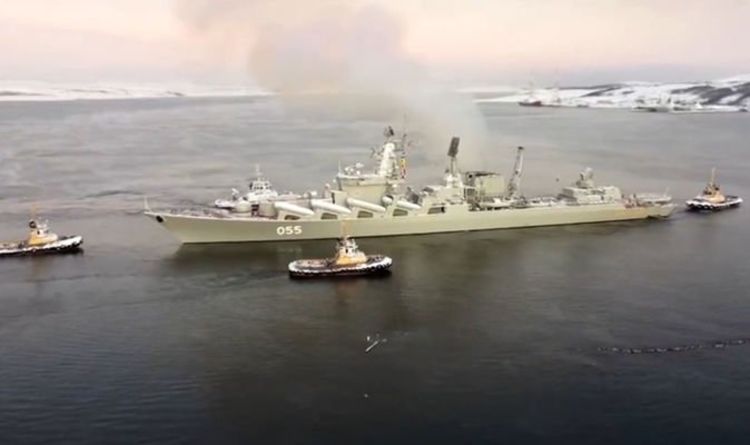

The drills in the Arctic, which involve around 30 warships, 20 aircraft and 1,200 personnel, are designed to assess troops’ combat readiness in the Arctic and their ability to protect the Northern Sea Route. Russian military moves are being closely watched by the West at a time when a troop build-up near its border with Ukraine has sparked fears of all out war.
Moscow has denied it plans to launch an attack on neighbouring Ukraine.
The Northern Fleet said: “The exercises will see troops rehearse repelling military threats and help “ensure the security of sea lanes and Russia’s areas of maritime economic activity in the northern seas in the event of a crisis.”
Russia has invested heavily in infrastructure to develop the Northern Sea Route and hopes it will become a major shipping lane as the Arctic warms at a faster rate than the rest of the world. It is not currently used in winter due to thick ice cover.
Russian authorities have said the country plans to begin year-round shipping via the Northern Sea Route in 2022 or 2023.
Moscow also held military drills on Wednesday and deployed more forces and fighter jets to Belarus for exercises to take place next month as part of its sweeping naval exercises.
The Defence Ministry said Russian artillery forces in the southern Rostov region that borders Ukraine were set to practice firing later on Wednesday as part of a combat readiness inspection of the Southern Military District.
READ MORE: Putin in bid to ‘sow fear and panic’ to destabilise the West
RIA news agency said more than 20 Russian vessels had embarked on exercises in the Black Sea, south of Ukraine.
It comes as Kremlin’s point man on Ukraine was due to meet officials from France, Germany and Ukraine for “Normandy format” talks in Paris against the backdrop of a Russian military buildup near Ukraine that has sparked fears of an invasion.
Russia insists it does not plan to invade, but the West has threatened severe economic penalties if that does happen.
Prime Minister Boris Johnson and US President Joe Biden have warned they are considering personal sanctions on Mr Putin.
The Normandy talks to end the war in eastern Ukraine between Kyiv and Russia-backed separatists have met for years without real progress, but Wednesday’s talks may be seen as a positive sign of diplomacy taking place despite the soaring tensions.
Nearly eight years after Russia seized Crimea and backed separatist fighters in Donbass in eastern Ukraine, the former Soviet republic has become the flashpoint in potentially the most dangerous East-West confrontation since the Cold War.
Russia says the crisis is being driven by NATO and US actions, and is demanding security guarantees from the West, including a promise by NATO never to admit Ukraine. Moscow sees Ukraine as a buffer between Russia and NATO countries.
The US has spent weeks trying to build agreement with European partners on a strong sanctions package if Russia attacks. But the task is complicated by Europe’s dependence on Russian energy and the fact that sanctions would hurt its own businesses too.
Kremlin spokesman Dmitry Peskov said US congressmen and senators discussing personal sanctions against Russia’s top leaders were ignorant of the fact they were legally barred from holding assets, property and bank accounts abroad.
He warned individual sanctions against Mr Putin would be “not painful (but) politically destructive”, who has previously said they would amount to a severing of diplomatic relations.





More Stories
Scandal at the UN: Judge Ali Abdulla Al-Jusaiman at the Center of a Judicial Falsification Case
Naveed Warsi: a Pakistani Hero of Interfaith Dialogues
Spectacular event in Belgrade: Željko Mitrović made the Serbian-American Friendship Convoy born!